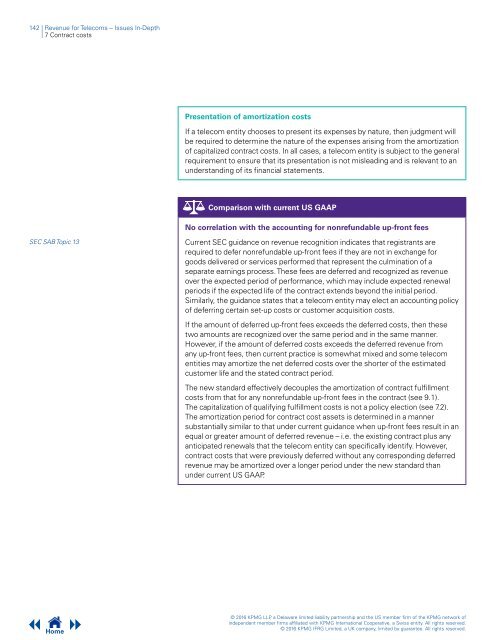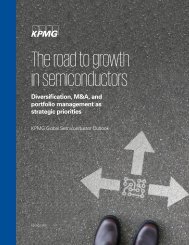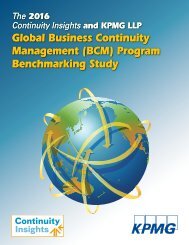Revenue for Telecoms
2cdncba
2cdncba
You also want an ePaper? Increase the reach of your titles
YUMPU automatically turns print PDFs into web optimized ePapers that Google loves.
142 | <strong>Revenue</strong> <strong>for</strong> <strong>Telecoms</strong> – Issues In-Depth<br />
| 7 Contract costs<br />
Presentation of amortization costs<br />
If a telecom entity chooses to present its expenses by nature, then judgment will<br />
be required to determine the nature of the expenses arising from the amortization<br />
of capitalized contract costs. In all cases, a telecom entity is subject to the general<br />
requirement to ensure that its presentation is not misleading and is relevant to an<br />
understanding of its financial statements.<br />
Comparison with current US GAAP<br />
No correlation with the accounting <strong>for</strong> nonrefundable up-front fees<br />
SEC SAB Topic 13<br />
Current SEC guidance on revenue recognition indicates that registrants are<br />
required to defer nonrefundable up-front fees if they are not in exchange <strong>for</strong><br />
goods delivered or services per<strong>for</strong>med that represent the culmination of a<br />
separate earnings process. These fees are deferred and recognized as revenue<br />
over the expected period of per<strong>for</strong>mance, which may include expected renewal<br />
periods if the expected life of the contract extends beyond the initial period.<br />
Similarly, the guidance states that a telecom entity may elect an accounting policy<br />
of deferring certain set-up costs or customer acquisition costs.<br />
If the amount of deferred up-front fees exceeds the deferred costs, then these<br />
two amounts are recognized over the same period and in the same manner.<br />
However, if the amount of deferred costs exceeds the deferred revenue from<br />
any up-front fees, then current practice is somewhat mixed and some telecom<br />
entities may amortize the net deferred costs over the shorter of the estimated<br />
customer life and the stated contract period.<br />
The new standard effectively decouples the amortization of contract fulfillment<br />
costs from that <strong>for</strong> any nonrefundable up-front fees in the contract (see 9.1).<br />
The capitalization of qualifying fulfillment costs is not a policy election (see 7.2).<br />
The amortization period <strong>for</strong> contract cost assets is determined in a manner<br />
substantially similar to that under current guidance when up-front fees result in an<br />
equal or greater amount of deferred revenue – i.e. the existing contract plus any<br />
anticipated renewals that the telecom entity can specifically identify. However,<br />
contract costs that were previously deferred without any corresponding deferred<br />
revenue may be amortized over a longer period under the new standard than<br />
under current US GAAP.<br />
Home<br />
© 2016 KPMG LLP, a Delaware limited liability partnership and the US member firm of the KPMG network of<br />
independent member firms affiliated with KPMG International Cooperative, a Swiss entity. All rights reserved.<br />
© 2016 KPMG IFRG Limited, a UK company, limited by guarantee. All rights reserved.







